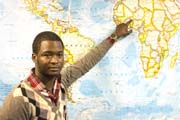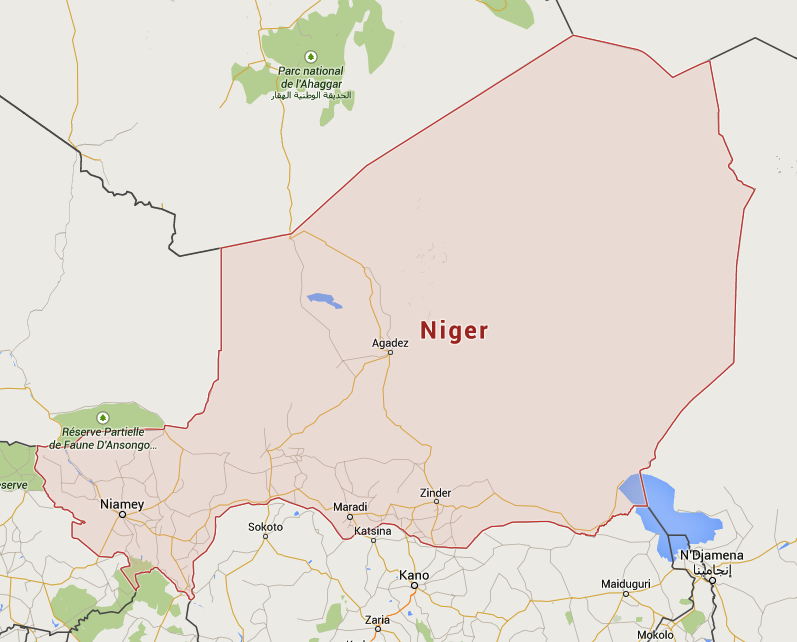Student plans to return to Africa some day


Amadou Baraze
Business Communications major Amadou Baraze said he misses the food and giving nature of home, but likes the environment here at OCCC.
“When you want to focus on … studying, this campus is very nice,” he said. “It’s a safe campus. There are a lot of great teachers. I really like this school.”
Baraze came to the U.S. one year ago from Niamey, Niger, a country in west Africa.
He first went to University of California, Los Angeles, but transferred to Oklahoma last semester to be with his sister.
He said his plans are to improve his English and transfer to the University of Oklahoma in the fall for his master’s degree.
Baraze said there are big differences between his home and here.
“[A] difference is the that here in the U.S. it is a developed country, and we are not a developed country,” he said. “We are trying to develop ourselves.”
He said another difference is the socialization between families and neighbors.
 Nigeria
Nigeria
Capital: Niamey
Population: 17.83 million (2013)
Size: 489,200 sq. miles (1.267 million km²)
Official Language: French
Currency: West African CFA franc
Government: Semi-presidential system
Religion: Islam is the dominant religion in Niger. Other religions include Animism and Christianity.
Details: Niger, officially the Republic of Niger, is a landlocked country in Western Africa, named after the Niger River.—www.google.com

“We’re really social there. People share a lot. I can’t say that here in the U.S. It’s more individual. Everyone is busy going to work or school.
“Besides Thanksgiving I don’t really think that you guys really have time to share with the family.”
Baraze wants others to know there is more to Africa than just war and disease.
“People can go there,” he said. “There are a lot of nice places like South Africa and there are some places in Africa that are really, really safe.
“I’ve never seen on TV the media showing the nice parts of Africa. They’re always showing the bad part of Africa like war and disease, AIDS, malaria or recently, Ebola.
“With Ebola they used to just talk about the fact that it’s in Africa, but it’s not all the continent. It’s a specific part … ,”
He said the media also misrepresents the U.S.
“ … In Africa, every time you saw some picture of the United States it’s always a nice place and everything, but they never show us that here there are also poor people,” he said.
“There’s also a lot of negative things everywhere in the world.”
One thing Baraze said surprised him was the number of homeless people in the U.S.
“When I was coming here, [I thought] everyone has a good life, but it’s not like that. I saw on the street there’s some people who cannot afford to have a house or to have a meal per day and it’s disturbing to me because as an African where I come from we share a lot.
“Sometimes here I think it’s like people are too focused on what they are doing and they don’t really have the time to see that close to them there’s someone who really needs help.”
Coming to America wasn’t a big culture shock for him. He said he traveled with his parents a lot for work and lived in France for awhile.
“I think here there’s a big difference between rich people and poor people. It’s huge. In Africa there’s also this difference but because people are social, we don’t really notice it.
“Sometimes you’ll see a very wealthy family living close to a poor family but they share everything. There’s not a big difference between them. So here there’s something I think we don’t see.”
Baraze said he is disturbed by certain questions he is asked.
“I had some people ask me if we still live in trees … . When I came here I was supposed to meet a lot of educated people and then people ask me those kind of questions.”
He wants people to know that it’s not that way anymore.
“When people have a bad idea of you, you have to show them that it’s not always like that.”
Baraze said his goal is to return to Africa.
“My goal is to learn from you guys and go back to my country and apply what I learned there. I don’t think I could help my country if I stay here.
“That’s why I want to go back and try to do something.”
To contact Katie Axtell, email communitywriter@occc.edu